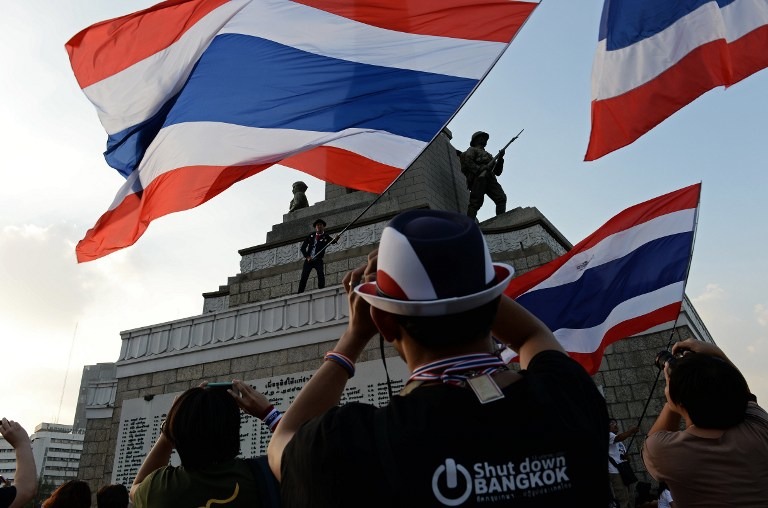SUMMARY
This is AI generated summarization, which may have errors. For context, always refer to the full article.

BANGKOK, Thailand – At an abandoned police post by a key intersection occupied by anti-government protesters in the Thai capital, rally guard Ton had no doubt who was in charge of security.
“We’re in control of the city now,” he said.
In a twist to a peculiarly Thai protest, police have almost deserted the streets during a new round of mass rallies aiming to topple Prime Minister Yingluck Shinawatra and curb the political dominance of her brother, former premier Thaksin.
“We’re providing the security for the protests, not the police,” said 25-year-old volunteer Ton, a tattoo snaking out from under his collar.
“The police have left. I have no idea where they are,” he added, giving only one name.
The demonstrators, led by firebrand opposition heavyweight Suthep Thaugsuban, want Yingluck to resign to make way for an unelected “people’s council”.
The civilian guards, identifiable by their black T-shirts, armbands and walkie-talkies, have stepped into the apparent vacuum left by the police, taking on traffic and crowd control duties – some with a degree of swagger.
“There hasn’t been any real police power for a long time now… because they only serve Thaksin not the people,” said guard Noppadon Isaraphukdee, 48.
Avoiding confrontation
Throughout the weeks of mass rallies, Yingluck has adopted defensive tactics to prevent violence from spiraling out of control, fearing widespread clashes could precipitate a military coup and the end of her administration.
She has been applauded by the United States for showing “restraint”, in contrast to a military crackdown on opposition protests under the previous government that left dozens dead in 2010.
Even if Yingluck wanted to send out soldiers to restore order, it is uncertain whether they would obey her orders.
The military – traditionally a staunch supporter of the anti-Thaksin royalist establishment – has said it will not crack down on the rallies, and the army chief has even refused to rule out a coup.
Meanwhile in a near-daily dance, police have retreated to barracks or backstreets, ceding ground to demonstrators and even allowing them to occupy police property.
When live ammunition has been used it has been by unidentified gunmen, whose victims include a policeman.
Authorities say they have used tear gas, water cannon and rubber bullets only as a final resort.
“It has been unexpected and surprising to both anti-and pro-Thaksin groups alike how non-violently the police have acted against the demonstrators,” said Paul Chambers director of research at the Institute of Southeast Asian Affairs at Chiang Mai University in northern Thailand.
“I would even say that Suthep is disappointed as he expected police repression to legitimize his campaign of pandemonium,” he added.
To protesters the police remain bonded to the enemy – the reviled government and Thaksin, who was himself once a mid-ranking policeman before his political rise and fall.
He was ousted by the military in 2006 and lives in self-exile to avoid a jail term for corruption, but is widely seen as controlling his sister’s government from overseas.
Police insist they’re still in charge
Vast crowds swamped the streets of Bangkok on Monday as protesters took over the main business and shopping districts of the city of 12-million in a carnival of color, but without a policeman in sight.
They erected stages at several sites, blocking arterial roads and setting up tents and soup kitchens to sustain their noisy rallies dubbed the “Bangkok shutdown”, which entered a second day on Tuesday without any violence.
The few cars and motorcycle taxis allowed through gleefully flouted one-way systems, but there were no obvious signs of wider chaos.
Authorities said 20,000 police and soldiers were deployed across the capital, but they were largely invisible.
In a secluded nightclub car park a few streets behind the main Asok intersection, a few dozen policeman ate and played cards, their protective vests slung over the backs of plastic chairs.
“We’re trying not to get close to the mob. They may get angry if they see us and that could spark clashes,” said one officer, who wanted to remain anonymous.
But suggestions the protesters were in control of the city were given short shrift.
“If the protest guards think they are cool by directing traffic, it’s up to them… we don’t think like them – we’re in charge of this situation.”
In front of a protest stage a short walk away, demonstrators disagreed.
Wielding a poster depicting Yingluck as a monitor lizard – an extreme insult in Thailand – being tamed by Suthep, one protester said Yingluck and her brother were losing control of the country.
“Now the people will take it back,” she said. – Rappler.com
Add a comment
How does this make you feel?
There are no comments yet. Add your comment to start the conversation.